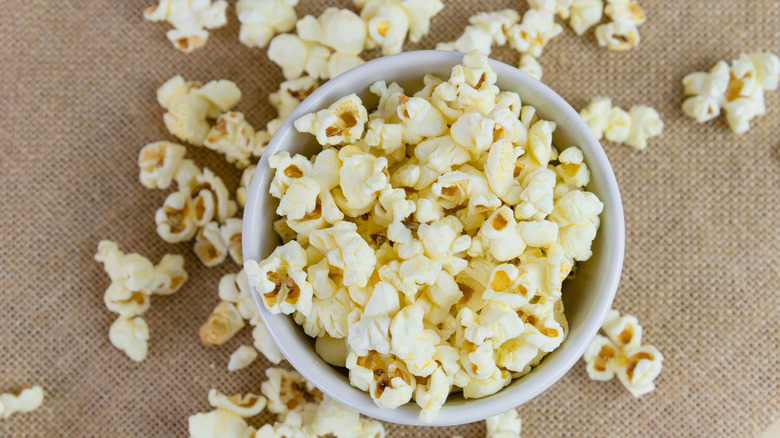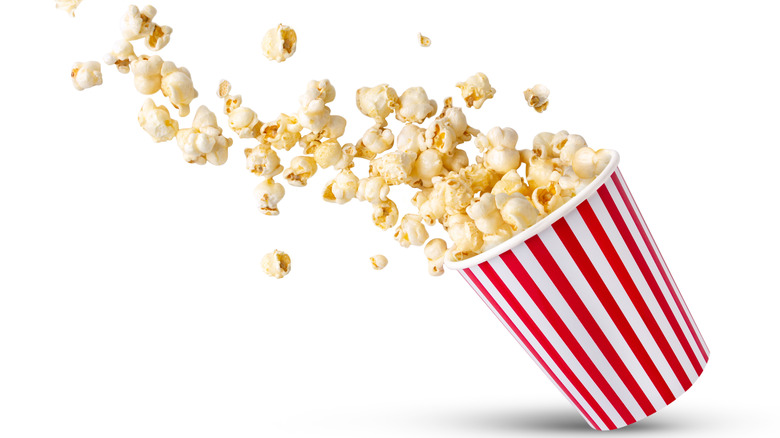Popcorn Actually Isn't That Bad For You. Here's Why
Popcorn is a classic snack food that many people all over the world enjoy for its savory flavor and satisfying crunch. However, folks may not know that popcorn is also a healthier alternative than many other common calorie-laden chips and snacks. Made by heating up a special kind of corn until it expands — or "pops" — popcorn satisfies the same salty snack cravings, but with fewer of the unhealthy additives and calories that are often found in other popular snack foods. As registered dietitian Claudia Hleap explained to Delish, "popcorn is a high fiber snack that often gets a bad rep. Popcorn is a whole grain, making it a good source of fiber. It's also full of popped air, meaning that it is less calorie dense than many other chip-like options."
Since popcorn is a whole grain, it provides many digestive and nutritional benefits, according to Healthline. For one, it contains a fair amount of essential nutrients, including iron, magnesium, phosphorus, zinc, potassium, manganese, and many B vitamins. Consuming a diet high in whole grains has also been shown to improve heart health and reduce the risk of obesity and type 2 diabetes; it even boosts levels of healthy gut bacteria, according to WebMD. Popcorn is also high in an antioxidant called polyphenols, which have been shown to improve digestive health, promote healthy blood circulation, and even help reduce the risk of certain cancers, according to the American Heart Association.
Popcorn is loaded with protein and fiber
A 3.5 ounce serving of popcorn contains just 387 calories, while also boasting 13 grams of protein and a whopping 15 grams of fiber — that's over half of the daily recommended fiber intake for women and over a third of the recommended value for men, according to Healthline. To that end, popcorn is a great low-calorie way to ensure you're getting the variety of health benefits fiber provides, including promoting good digestive health and reducing the risk of illnesses like heart disease and type 2 diabetes, as well as aiding in weight loss.
"I could give you 200 calories of a milkshake, and that might be five or six ounces. Your body isn't going to recognize you've had 200 calories and feel satisfied. But if you eat 200 calories of fruits and vegetables, which are high in fiber and water, you're going to eat quite a large portion size to get to 200 calories. The same goes for popcorn," Maya Vadiveloo, a University of Rhode Island assistant professor of nutrition and food sciences, explained to the American Heart Association.
However, snackers should be aware that there are different ways of preparing popcorn, and some methods do make the treat less healthy than the traditional air-popped version. For instance, many types of prepackaged microwavable popcorn contain an unhealthy additive called perfluorooctanoic acid, which has been linked to a variety of heath issues, including thyroid problems and ADHD, according to Healthline.
Not all popcorn is created equal
Some brands of popcorn also add a good deal of butter and salt to their product, which increases the amount of fat, sodium, and calories in each serving. To that end, shoppers should check the nutrition content of their popcorn to ensure they aren't accidentally consuming any sneaky added ingredients. In addition to increasing the calorie content, some artificial butter flavoring also contains an ingredient known as diacetyl, which might be harmful to the lungs. Additionally, extra butter, even of the non-artificial variety, can pack on loads of added calories, unhealthy fat (including trans fats), oils, and even sugar, which can make popcorn far less healthy.
So the next time you want a salty, crunchy treat, you might want to think twice before reaching for a bag of potato chips. A bag of air popped popcorn will provide the same delicious flavor you crave, along with a healthy dose of fiber, nutrients, and whole grains that your body will thank you for. Just make sure to choose a natural air-popped version of popcorn that's free from unhealthy added ingredients or chemicals. That way, you can be sure you're only getting the health benefits the snack provides with none of the sneaky additives that can potentially be harmful.


